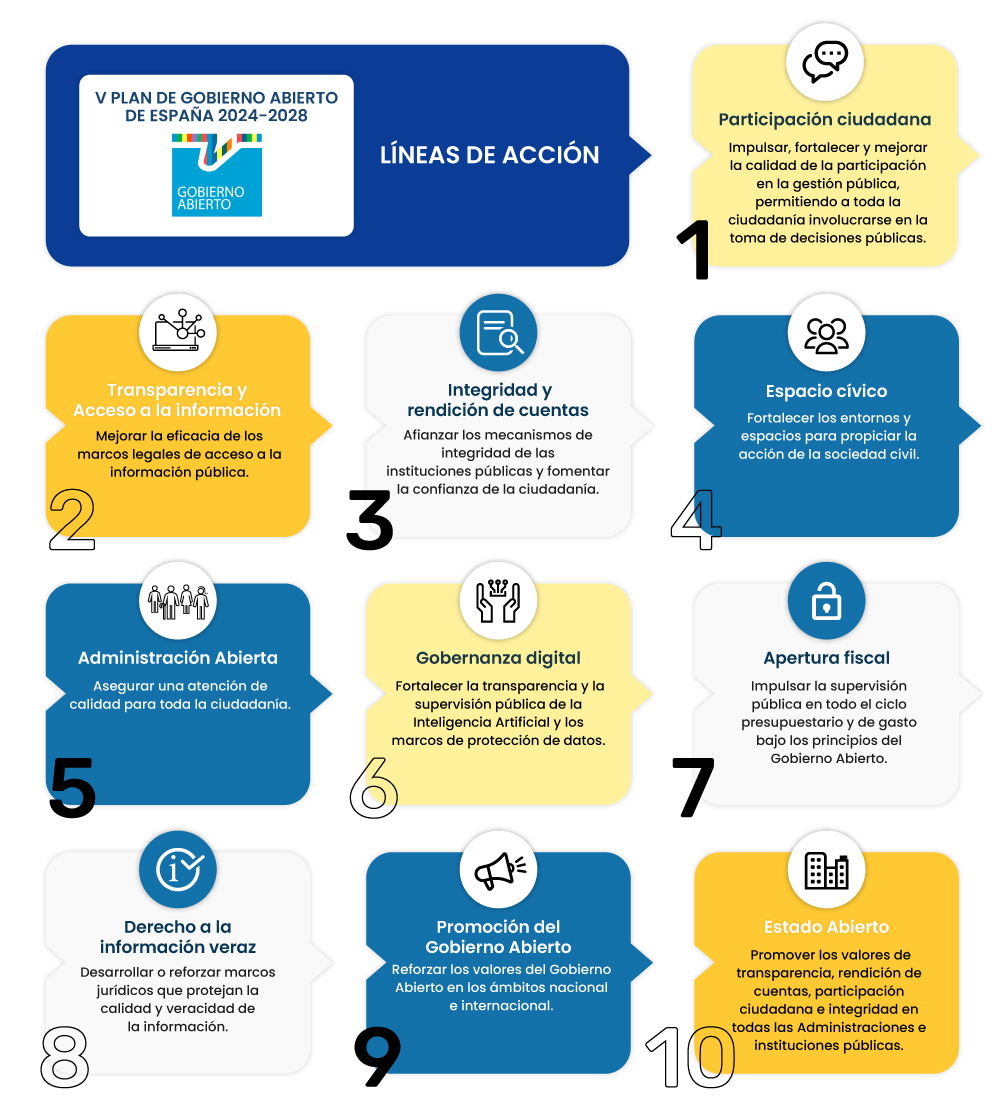
On October 6, the V Open Government Plan was approved, an initiative that gives continuity to the commitment of public administrations to transparency, citizen participation and accountability. This new plan, which will be in force until 2029, includes 218 measures grouped into 10 commitments that affect the various levels of the Administration.
In this article we are going to review the key points of the Plan, focusing on those commitments related to data and access to public information.
A document resulting from collaboration
The process of preparing the V Open Government Plan has been developed in a participatory and collaborative way, with the aim of collecting proposals from different social actors. To this end, a public consultation was opened in which citizens, civil society organizations and institutional representatives were able to contribute ideas and suggestions. A series of deliberative workshops were also held. In total, 620 contributions were received from civil society and more than 300 proposals from ministries, autonomous communities and cities, and representatives of local entities.
These contributions were analysed and integrated into the plan's commitments, which were subsequently validated by the Open Government Forum. The result is a document that reflects a shared vision on how to advance transparency, participation and accountability in the public administrations as a whole.
10 main lines of action with a prominent role for open data
As a result of this collaborative work, 10 lines of action have been established. The first nine commitments include initiatives from the General State Administration (AGE), while the tenth groups together the contributions of autonomous communities and local entities:
- Participation and civic space.
- Transparency and access to information.
- Integrity and accountability.
- Open administration.
- Digital governance and artificial intelligence.
- Fiscal openness: clear and open accounts.
- Truthful information / information ecosystem.
- Dissemination, training and promotion of open government.
- Open Government Observatory.
- Open state.

Figure 1. 10 lines of action of the V Open Government Plan. Source: Ministry of Inclusion, Social Security and Migration.
Data and public information are a key element in all of them. However, most of the measures related to this field are found within line of action 2, where there is a specific section on opening and reusing public information data. Among the measures envisaged, the following are contemplated:
- Data governance model: it is proposed to create a regulatory framework that facilitates the responsible and efficient use of public data in the AGE. It includes the regulation of collegiate bodies for the exchange of data, the application of European regulations and the creation of institutional spaces to design public policies based on data.
- Data strategy for a citizen-centred administration: it seeks to establish a strategic framework for the ethical and transparent use of data in the Administration.
- Publication of microdata from electoral surveys: the Electoral Law will be amended to include the obligation to publish anonymized microdata from electoral surveys. This improves the reliability of studies and facilitates open access to individual data for analysis.
- Support for local entities in the opening of data: a grant program has been launched to promote the opening of homogeneous and quality data in local entities through calls and/or collaboration agreements. In addition, its reuse will be promoted through awareness-raising actions, development of demonstrator solutions and inter-administrative collaboration to promote public innovation.
- Openness of data in the Administration of Justice: official data on justice will continue to be published on public portals, with the aim of making the Administration of Justice more transparent and accessible.
- Access and integration of high-value geospatial information: the aim is to facilitate the reuse of high-value spatial data in categories such as geospatial, environment and mobility. The measure includes the development of digital maps, topographic bases and an API to improve access to this information by citizens, administrations and companies.
- Open data of the BORME: work will be done to promote the publication of the content of the Official Gazette of the Mercantile Registry, especially the section on entrepreneurs, as open data in machine-readable formats and accessible through APIs.
- Databases of the Central Archive of the Treasury: the public availability of the records of the Central Archive of the Ministry of Finance that do not contain personal data or are not subject to legal restrictions is promoted.
- Secure access to confidential public data for research and innovation: the aim is to establish a governance framework and controlled environments that allow researchers to securely and ethically access public data subject to confidentiality.
- Promotion of the secondary use of health data: work will continue on the National Health Data Space (ENDS), aligned with European regulations, to facilitate the use of health data for research, innovation and public policy purposes. The measure includes the promotion of technical infrastructures, regulatory frameworks and ethical guarantees to protect the privacy of citizens.
- Promotion of data ecosystems for social progress: it seeks to promote collaborative data spaces between public and private entities, under clear governance rules. These ecosystems will help develop innovative solutions that respond to social needs, fostering trust, transparency and the fair return of benefits to citizens.
- Enhancement of quality public data for citizens and companies: the generation of quality data will continue to be promoted in the different ministries and agencies, so that they can be integrated into the AGE's centralised catalogue of reusable information.
- Evolution of the datos.gob.es platform: work continues on the optimization of datos.gob.es. This measure is part of a continuous enrichment to address changing citizen needs and emerging trends.
In addition to this specific heading, measures related to open data are also included in other sections. For example, measure 3.5.5 proposes to transform the Public Sector Procurement Platform into an advanced tool that uses Big Data and Artificial Intelligence to strengthen transparency and prevent corruption. Open data plays a central role here, as it allows massive audits and statistical analyses to be carried out to detect irregular patterns in procurement processes. In addition, by facilitating citizen access to this information, social oversight and democratic control over the use of public funds are promoted.
Another example can be found in measure 4.1.1, where it is proposed to develop a digital tool for the General State Administration that incorporates the principles of transparency and open data from its design. The system would allow the traceability, conservation, access and reuse of public documents, integrating archival criteria, clear language and document standardization. In addition, it would be linked to the National Open Data Catalog to ensure that information is available in open and reusable formats.
The document not only highlights the possibilities of open data: it also highlights the opportunities offered by Artificial Intelligence both in improving access to public information and in the generation of open data useful for collective decision-making.
Promotion of open data in the Autonomous Communities and Cities
As mentioned above, the IV Open Government Plan also includes commitments made by regional bodies, which are detailed in line of action 10 on Open State, many of them focused on the availability of public data.
For example, the Government of Catalonia reports its interest in optimising the resources available for the management of requests for access to public information, as well as in publishing disaggregated data on public budgets in areas related to children or climate change. For its part, the Junta de Andalucía wants to promote access to information on scientific personnel and scientific production, and develop a Data Observatory of Andalusian public universities, among other measures. Another example can be found in the Autonomous City of Melilla, which is working on an Open Data Portal.
With regard to the local administration, the commitments have been set through the Spanish Federation of Municipalities and Provinces (FEMP). The Network of Local Entities for Transparency and Citizen Participation of the FEMP proposes that local public administrations publish, at least, to choose from the following fields: street; budgets and budget execution; subsidies; public contracting and bidding; municipal register; vehicle census; waste and recycling containers; register of associations; cultural agenda; tourist accommodation; business areas and Industrial; Census of companies or economic agents.
All these measures highlight the interest in open data in Spanish institutions as a key tool to promote open government, promote services and products aligned with citizen needs and optimize decision-making.
A tracking system
The follow-up of the V Open Government Plan is based on a strengthened system of accountability and the strategic use of the HazLab digital platform, where five working groups are hosted, one of them focused on transparency and access to information.
Each initiative of the Plan also has a monitoring file with information on its execution, schedule and results, periodically updated by the responsible units and published on the Transparency Portal.
Conclusions
Overall, the V Open Government Plan seeks a more transparent, participatory Administration oriented to the responsible use of public data. Many of the measures included aim to strengthen the openness of information, improve document management and promote the reuse of data in key sectors such as health, justice or public procurement. This approach not only facilitates citizen access to information, but also promotes innovation, accountability, and a more open and collaborative culture of governance.


